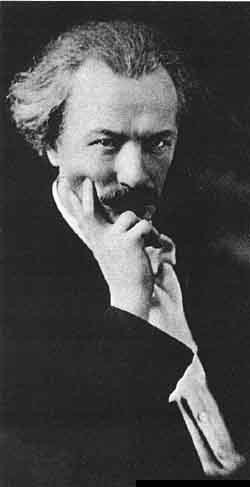
Paderewski - Sensational Pianist
by Feliks Klempka
|
|
Ignacy Jan Paderewski, (1860-1941) one of the most sensational pianists of modern times, received early musical training from Peter Sowinski. His first public piano concert was at age 11. His playing aroused interest among wealthy patrons who took him to Kiev. He was then sent to Warsaw where he entered the Conservatory and learned to play trombone, joined the school band, and continued serious study of the piano. In 1875 he toured the provincial Russian towns with the Polish violinist Cielewicz and took courses in composition at the Warsaw Conservatory where, after graduation in 1878, he was engaged as a member of the piano faculty. In 1882 he went to Berlin to study composition with Kiel and, subsequently. orchestration in Berlin with Heinrich Urban. It was there that he met Anton Rubinstein who urged him to study piano performance. He resigned from his teaching job at the Warsaw Conservatory and went on to Vienna to study with Leszetycki (Leschetizky).
Paderewski continued his career as a concert pianist and gave his first Paris recital in 1888. Soon thereafter he began receiving attention as a composer. He made his London debut in 1890. Then, in 1891, he made a concert tour of the United States, making his American debut in New York City and giving 107 concerts in 117 days. His wit quickly made him a social lion in wealthy American salons. He also made concert tours of Germany, South America, South Africa, Australia and New Zeland.
Cosmopolitan in his culture, Paderewski remained a great Polish patriot. And, although monarchs and statesmen have been known to venture into music performance, Paderewski is probably the only full-time musician to have become a successful politician. Harvey Sachs, in his book Virtuoso, assesses Paderewski’s brief encounter with affairs of state in these words: "Immediately after the Armistice {19l8] he returned to Poland. The country’s provisional leader, General Józef Pilsudski, saw that Paderewski was popular with the people and trusted by the victorious powers who liked his strong anti-Socialism. He invited Paderewski to form a nonpartisan government in Warsaw; and so from January to November 1919 the world's most famous pianist was prime minister and foreign minister of a reborn Poland.”"
Paderewski returned to the U.S. in 1940. He died in New York City a few months later. On the order of President Roosevelt, he was given a state burial and his remains were interred in the Arlington National Cemetery, pending the return of his remains to Free Poland, which has now taken place. Paderewski received many honorary degrees, including at the Universities of Lwow, Yale, Krakow, Oxford, Columbia, Poznan, and Glasgow. He held the Grand Cross of the French Legion of Honour.
| Info-Poland a clearinghouse of information about Poland, Polish Universities, Polish Studies, etc. |
